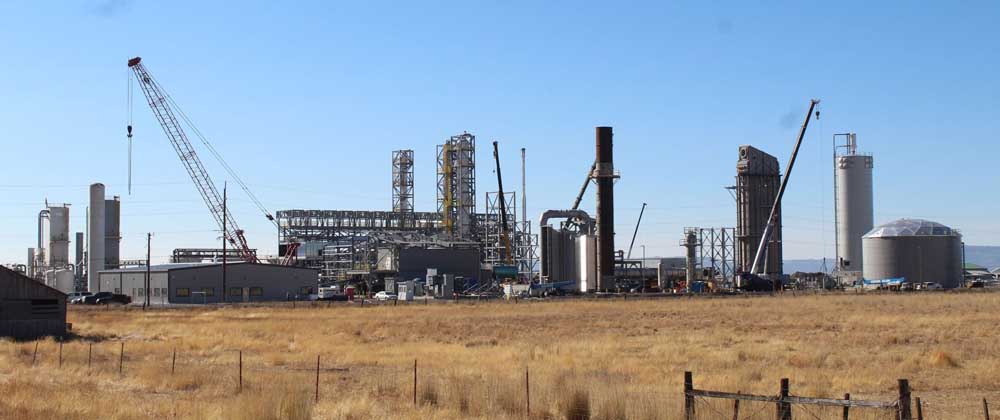Failed $300 million biofuels project in Southern Oregon gets new owner, new business plan
Published 8:00 am Thursday, April 20, 2023

- Work at the Red Rock Biofuels site in Lakeview. A company looking to build a multibillion-dollar biodiesel refinery in northwest Oregon has acquired the assets of Red Rock, with plans to pivot that facility away from its initial production plan. NEXT hopes to resume construction on the facility, which is 70% complete, by the end of the year and start producing fuels by mid-to-late 2025.
A company looking to build a multibillion-dollar biodiesel refinery in northwest Oregon has acquired the assets of a failed biofuels project in Southern Oregon, with plans to pivot that facility away from its initial production plan.
A subsidiary of Next Renewable Fuels closed on the deal last week with bondholders of Red Rock Biofuels, who foreclosed on the facility in Lakeview after its backers failed to make principal and interest payments on some $300 million in debt.
Chris Efird, a Texas financier who is the chief executive of Next, said the company intends to repurpose the facility to make “renewable natural gas” from wood waste rather than the liquid aviation fuel originally envisioned by Red Rock.
Efird said terms of the deal will be described in securities filings sometime in May, as Next is in the process of merging with a shell company to get its shares listed on a public exchange.
“We’re happy where it ended up,” he said. “It’s a good opportunity, and people in Lake County are enthusiastic about seeing the project move forward and not just have it scooped up for scrap, which was one of the other options.”
Next hopes to resume construction on the facility, which Efird said is 70% complete, by the end of the year and start producing fuels by mid-to-late 2025.
Backers of the Red Rock project launched efforts nearly a decade ago to build the cutting-edge facility in Lakeview but repeatedly ran into obstacles, even as project skeptics questioned its feasibility.
The project was originally slated to come online in 2017, converting woody biomass such as slash from logging and forest thinning projects in the area into jet-grade liquid fuel that could be used as a substitute for the fossil-based fuel currently utilized to power the nation’s aviation fleet.
Its development was supported by a $75 million funding award from the Department of Defense; fuel purchase commitments from FedEx and Southwest Airlines; more than $2 million in infrastructure improvements funded by the town of Lakeview and Business Oregon; and about $300 million in tax-exempt economic development bonds issued in 2018 through the state of Oregon. The state had no obligation to repay those bonds.
But backers didn’t break ground until 2018, and five years later, the refinery remains incomplete and construction has been halted for more than a year.
Skeptics have long maintained that it was technologically infeasible, relying on a fuel production process developed in the 1920s in Germany that has never been successfully deployed at scale. It was also dogged by questions of whether there was an adequate source of wood waste in the immediate vicinity to economically supply the facility, and its plans to use a Lake County railway that has a long history of safety violations to transport the liquid fuels to market in California.
Efird said Next has no interest in making liquid fuels in Lakeview, and will be using an entirely different gasification process, run at much higher temperatures, to convert the wood slash into streams of methane.
“It’s the same chemical makeup, just like methane coming off a pig farm,” Efird said of the so-called renewable natural gas.
That gas could be transported to market via the nearby Ruby pipeline, which runs from Opal, Wyoming, to a gas hub in Malin, near Oregon’s border with California. That makes transportation of the facility’s product more economical and safer than the rail or truck transport that Red Rock’s backers had proposed.
To be clear, burning that methane still emits carbon dioxide, and climate change activists want to see the country move away from the use of natural gas altogether, regardless of the source. NEXT’s plans to separately produce liquid biodiesel in Port Westward, on the Columbia River outside the city of Clatskanie, have run into stiff opposition from local residents and environmental groups.
Efird said the goal in this instance is to reduce the carbon intensity of the fuel to a dramatically lower level than pipeline gas produced from fossil fuel drilling.
The company plans to work with PacifiCorp, the electricity provider in Lakeview, to eventually source all the electricity it uses to power the gasification process from renewable resources, reducing the facility’s emissions profile. That’s not possible today because of the paucity of available renewables, transmission constraints and the lack of a process to certify that all the electricity used is green power.
In the meantime, it would use power generated at a co-generation facility on site, and whatever is coming down the utility’s transmission lines, which is a mix of green and fossil power.
Federal regulations currently prohibit the project from sourcing wood waste off federal land. But Efird said the company’s initial studies validated that there is enough “sustainably certified” woody biomass being generated by logging projects in the area to run the facility at capacity for the foreseeable future.
“It’s absolutely a major concern,” he said. “You have to have that supply and we’re comfortable it’s there.”
“We’re happy where it ended up. It’s a good opportunity, and people in Lake County are enthusiastic about seeing the project move forward and not just have it scooped up for scrap, which was one of the other options.”
— Chris Efird, CEO of NEXT Renewable Fuels






